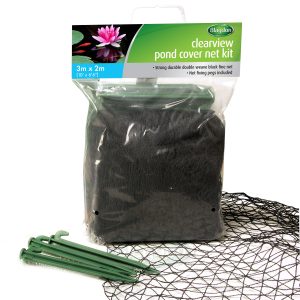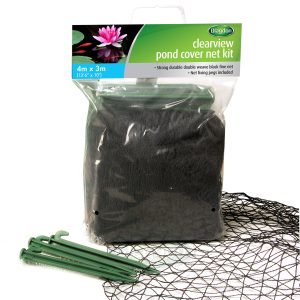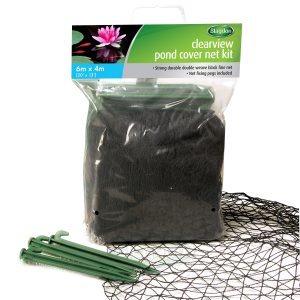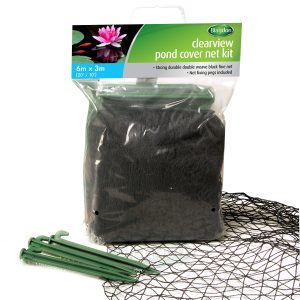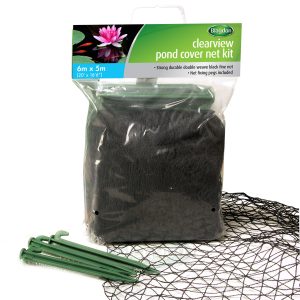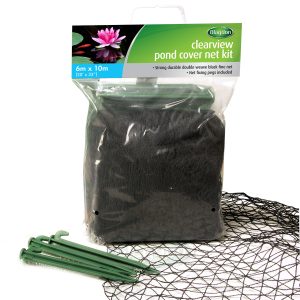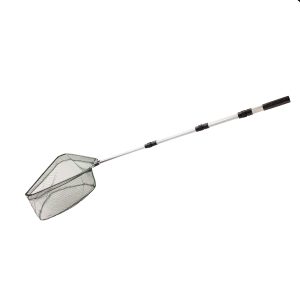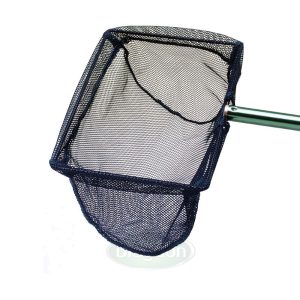Pond Nets

Catch them all! Fish, cleaning and cover nets
Pond Net FAQs
What are the different types of pond nets?
There are two types of pond nets:
Fish & cleaning nets – used to catch and transfer fish in a pond. They typically have a fine mesh that allows water to pass through, but prevents fish from escaping. Also used to remove debris, leaves, and other unwanted materials from the surface of the pond.
Cover nets – used to cover the entire pond to prevent leaves, debris, and predators from entering the water. They are typically made of a durable mesh material that allows sunlight and rainwater to pass through.
What size fish net should I use for my pond?
First, consider the size and species of fish you have. For small to medium-sized fish, a net with a diameter of around 12-18 inches would be suitable. Larger fish may require a net diameter of 18-24 inches or more.
How do I choose the right size of pond net?
Choosing the right net size is essential to ensure your pond has effective cover. Here are some key factors to consider:
- Measure the length and width of your pond. Choose a net that is large enough to cover the whole surface without leaving any gaps where leaves, debris, or predators can enter.
- Consider the depth of the pond. If your pond is deep, you may need a larger net to ensure it reaches all the way to the bottom and provides complete cover.
- Take into account the shape of your pond. If your pond has irregular shapes or contours, you may need a net that can be customised or adjusted to fit properly.
- Think about your specific needs and concerns. If you live in an area with a lot of trees or where predators are common, you may want to opt for a larger net that provides extra protection.
Are pond cover nets difficult to install and remove?
Pond nets are fairly simple to set up and remove. Most pond nets come with pegs that make it easy to secure the net in place and stop it from shifting or flying off.
To install a pond net, simply unroll it over the pond and use the pegs to anchor it down. Make sure the net is pulled tightly and evenly across the entire surface.
Removing a pond net is just as easy. Remove the pegs and carefully fold or roll up the net, being mindful of any debris or leaves that may have gathered on top. Store the net in a clean and dry place until you need to use it again.
How often should I remove debris from my pond cover net?
Ideally, you should clean up the cover net as soon as you notice a significant amount accumulating. Depending on the circumstances, you may need to clean the net every few days or once a week.
By removing debris, you prevent it from sinking into the pond, which can lead to water quality issues or harm to fish.
Simply lift the net and carefully shake or remove the debris by hand. It’s important to handle the debris properly and dispose of it away from the pond. Some materials, like leaves, might release harmful substances as they decompose.
Can a pond cover net damage plants and fish?
Properly installed pond nets will not cause any harm to your aquatic plants or fish. In fact, they will help protect them from harm. While pond nets act as a barrier, they are designed with small enough mesh openings to allow sunlight, air, and rainwater to reach your plants and provide the necessary environment for your fish to thrive.
Can I use a cover net all year-round?
Cover nets can be used year-round. For example, in the autumn, when falling leaves are more prevalent, it becomes useful for preventing excessive debris from entering your pond.
Or, during the winter season, it can provide cover against snow or ice buildup.
In the warmer months, when the risk of predators is higher, a net can offer an added layer of protection for your pond. By adjusting the fit and tightness of the net, you can adapt its usage to support the changing seasons and requirements of your pond.

